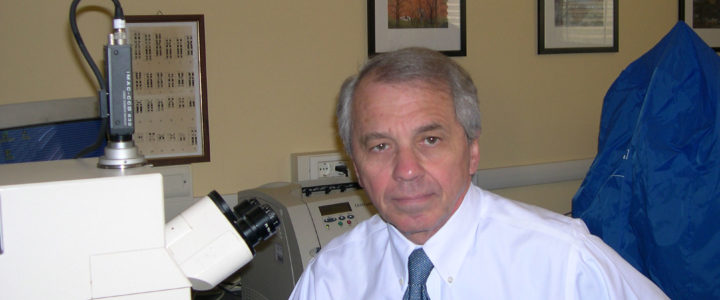With an $80,000 grant from FRAXA Research Foundation over 2 years, Dr. Ravi Allada and his team studied at Northwestern University sleep behaviors in Fragile X fruit flies. These fruit flies are useful for several important reasons; not only do they have a good cognitive phenotype, they also have a clear disturbance of circadian rhythms. This is an important model for human hyperactivity and sleep disorders, and this group studied the underlying mechanisms in an effort to find treatments for the human conditions.
Read more2006-2010 Grants
AMPAkines and BDNF in Fragile X: UCI Researchers Restore Memory Process in Fragile X

With a $104,498 grant from FRAXA Research Foundation from 2003-2008, Dr. Julie Lauterborn at the University of California has done several studies on dentritic spines and finding treatment targets for memory retention in Fragile X mice.
Read moreDevelopment of the Fragile X Brain: Cellular Processes Regulated by FMRP During Development

With a $120,000 grant from FRAXA Research Foundation over 2 years, Dr. Peter Kind and his team at the University of Edinburgh will study the way FMRP affects and is affected by cortical development.
Read moreTargeting the Role of Group 1 Metabotropic Glutamate Receptors

With a $40,000 grant from FRAXA Research Foundation in 2008, Dr. Huibert Mansvelder and his team at the University of Amsterdam studied the role of different receptors and their reactions to drug compounds.
Read moreEffects of Alternative Splicing at FMR1 Exon 15 on Understanding Fragile X Syndrome

With a $118,500 grant from FRAXA Research Foundation from 2007-2008, Dr. Robert Denman and his team at the New York State Institute for Basic Research studied protein splicing, specifically looking at exon 15-encoded residues of of FMPR.
Read moreMolecular Basis of Fragile X Syndrome: Genetic Modeling in Zebrafish

With a $52,500 grant from FRAXA Research Foundation in 2008, Dr. Robert Richards and his team from the University of Adelaide studied zebrafish models and embryo development abnormalities to search for treatment targets.
Read moreIn Vitro Reactivation of the Fragile X Gene

With a $60,000 grant from FRAXA Research Foundation, Dr. Giovanni Neri and his team at Universita Cattolica del S. Cuore explored reactivation of the FMR1 gene and characterization of cell lines with unmethylated full mutation.
Read moreClinical Trial of Aripiprazol in Fragile X Syndrome

With a FRAXA Research Foundation grant of $30,000 in 2006, Dr. Erickson conducted a pilot clinical trial of an available medicine, aripiprazole (brand-name Abilify). This was an open-label 12-week trial in 12 people ages 6–25 years with Fragile X. Results were promising, and published: 10 of the 12 participants showed behavioral improvements.
Read moreFRAXA Contributes $10,000 to NIH grant to Seaside Therapeutics

Randy Carpenter, MD Principal Investigator with Mark Bear, PhD, MIT Co-Investigator (2007) conducted a clinical development of mGluR5 antagonists to treat Fragile X Syndrome and Autism. Seaside Therapeutics received a major grant from the NIH, with additional funding from FRAXA and Cure Autism Now (CAN) to develop STX107, a selective mGluR5 antagonist, as a treatment for Fragile X. Unfortunately, Seaside has since discontinued development of STX107.
Read moreTaurine and Somatostatin as Potential Treatments for Fragile X Syndrome: A Unifying Neuro-Endocrine Hypothesis
With a $74,000 grant from FRAXA Research Foundation, Dr. Abdeslem El Idrissi at CUNY explored the GABA receptor system in Fragile X mice and tested somatostatin and taurine as potential therapies for Fragile X; while somatostatin must be infused intravenously, taurine is available as a nutritional supplement.
Read moreFMRP-MAP1b RNA Interactions in Fragile X Syndrome

With a $95,000 grant from FRAXA Research Foundation from 2006-2007, Dr. Mihaela Mihailescu and her team at Dusquesne University studied the relationship between FMRP, RNA sequences, and G quartet structure. Results published.
Read moreRegulation of Group I Metabotropic Glutamate Receptor Trafficking in Fragile X

With an $83,500 grant from FRAXA Research Foundation in 2005 and 2007, Dr. Anna Fracesconi at Albert Einstein College studied the patterns and pathways of different receptors related to Fragile X.
Read moreDecreased Excitatory Drive onto Parvalbumin-Positive Neocortical Inhibitory Neurons in a Mouse Model of Fragile X Syndrome

With an $80,000 grant from FRAXA Research Foundation over 2006-7, Drs. Jay Gibson and Kimberly Huber at the University of Texas at Southwestern examined if the defected inhibitory neurotransmission was a primary or secondary symptom of Fragile X to determine where future treatment targets should be focused.
Read moreElectrophysiological, Biochemical and Immunohistochemical Characterization of Kv3.1 in Auditory Brainstem Nuclei in the Fragile X Knockout Mouse

With $80,000 in funding from FRAXA over several years, the Yale University team of Leonard Kaczmarek, PhD showed that loss of FMRP leads to an increased Kv3.1 potassium currents. This change impairs timing of action potentials in auditory neurons (and likely others throughout the brain).
Read moreBaclofen: GABA(B) Receptor Supersensitivity and Normalization of Behavioral Abnormalities by Various GABA(B) Agonists Including Baclofen in FMRP Deficient Mice

With $110,000 in grants from FRAXA Research Foundation over several years, Dr. Miklos Toth from Cornell University discovered increased startle response in Fragile X mice and that baclofen can correct this phenotype.
Read moreExperimental Compound FRAX486 Reverses Signs of Fragile X in Mice

With an $81,000 grant from FRAXA Research Foundation from 2005-2006, Dr. Susumu Tonegawa and his team at MIT studied the enzyme PAK to determine how it could be used for a treatment target. Results published.
Read moreProtein Synthesis in Interneurons in Fragile X Mice

With a $100,000 grant from FRAXA Research Foundation from 2004-2006, Dr. Oswald Steward and his team at the University of California studied protein synthesis alterations in Fragile X mice in the brains’ interneurons.
Read moreTherapeutic Interventions in FMR1 Knockout and Transgenic Mice: Role of the FMR1 Gene

With a $229,000 grant from FRAXA Research Foundation in 2006, Drs. Richard Paylor, David Albeck, and Francis Brennan at the Baylor College of Medicine found that, in mice as in humans, the level of Fragile X protein in brain cells plays a prominent role in determining levels of activity and anxiety.
Read moreSplicing Variations of the Fragile X Gene

With an $80,000 grant from FRAXA Research Foundation from 2005-2006, Dr. David Morris and his team at the University of Washington aimed to understand the variation in distribution and function of FMRP isoforms, sought to identify isoforms of FMRP in mouse brain, and define the expression pattern of these versions of the protein.
Read moreExamining the Amygdala in Mouse Models of Fragile X

With a $63,000 grant from FRAXA Research Foundation in 2006, Dr. Joseph LeDoux and his team at New York University studied the role of the amygdala in Fragile X syndrome using mouse models.
Read moreSocial Deficits in Fragile X Syndrome: Do Gene-Gene Interactions Play a Role?

With a $100,000 grant from FRAXA Research Foundation from 2005-2006, Drs. Jean Lauder and Sheryl Moy at the University of North Carolina looked for gene-gene interactions in Fragile X syndrome.
Read moreMetabotropic Glutamate Receptor Function in Fragile X Knockout Mice

With $143,000 in grants from FRAXA Research Foundation from 2004-2006, Drs. Walter Kaufmann, Richard Huganier, Paul Worley, and David Lieberman at Johns Hopkins University studied the molecular dynamics of mGluRs in areas involved in cognition in the Fragile X knockout mouse.
Read moreRole of FMRP Interacting Protein CYFIP1 in Prader-Willi and Fragile X Syndromes

With a $105,000 grant from FRAXA Research Foundation from 2005-2006, Dr. Yong-Hui Jiang at Baylor College of Medicine explored the relationship between Fragile X syndrome and Prader-Willi syndrome.
Read moreDrosophila CYFIP, a Molecular Link Between Actin Cytoskeleton Remodeling and Fragile X

With $130,000 in funding from FRAXA Research Foundationfrom 2004-2006, Dr. Angela Giangrande at the Universite Louis Pasteur investigated the interactions between dendrites, messenger mRNA, and the cytoskeleton in fruit flies, which are a simple yet powerful system in which multiple genes can be manipulated with relative ease.
Read moreGenetic and Behavioral Analyses of the dFMR1 Pathway in Drosophila Peripheral Nervous System

With a $160,000 grant from FRAXA Research Foundation from 2004-2006, Dr. Fen-Biao Gao and his team at the University of California studied the relationship between mRNA and FMRP.
Read more
